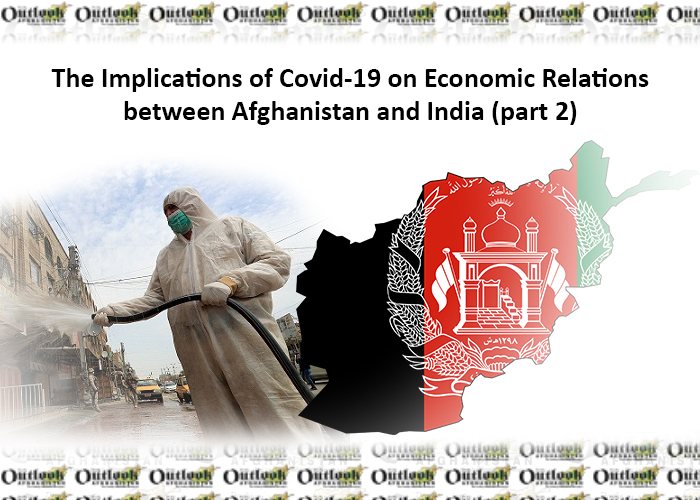In the previous part of this article, it was theoretically explained how the outbreak of covid-19 has damaged today’s interdependent economic relations of the countries including Afghanistan and India.
At this step, we need to concentrate on the objective level of the corona-virus implication on economic relations of the two with providing comparative figures and statistical analysis in various economic areas such as aerial transportation income, imports and exports, people to people interactions, and also customarily state cooperation.
In regard to aerial trade activities, both Afghanistan and India faced a lot of challenges. Last year, when India-Pakistan relations were strained over the Kashmir issue, the two countries actually engaged in military conflict in the Kashmir region. As Pakistan closed its airspace to India and the planes, India firstly used Iranian airspace and then Afghanistan, and then Asia. According to international law, Afghanistan was entitled to $ 950 per flight, which was a significant amount if calculated based on all flights performed, but during the Corona virus crisis, these flights were completely blocked, causing Afghanistan’s profits to fall and stop. Indian Airlines which is considered as one of the largest airlines in South Asia was also affected, causing damage to the economy of both countries. This is still true in-ground transportations.
In relation to unemployment and poverty, both India and Afghanistan were impacted during the quarantine, but Afghanistan was more impacted during the first and third wave of covid-19. According to the US Special Inspector General for Afghanistan Reconstruction (SIGAR) about the level of poverty, it had been around 54.5% of the population below the poverty line in 2019, but it increased to 72% in early 2021 and the unemployment rate was projected to rise to 37.9% up at end of 2020, from 23.9% in 2019. Although the critical condition of this war-torn country is incomparable to the economical condition of India as a whole undeniably India also faced some severe economic fluctuation that negatively affected the economic relation between Afghanistan and India.
For example, according to irna.ir/news, during the covid-19 outbreak, more than 140 million Indian people have lost their jobs and so more than 45% population have faced shortage of incomes comparing to the previous years in that country. By the way, we need to bear in mind that, unlike India, the poverty crisis in Afghanistan is not merely emanated from covid-19 outbreak but also from rising of violence, and the anarchic situation of the free-market of the country.
In addition to the above-mentioned areas, the outbreak of covid-19 has also impacted the implementation of large economic projects. It was supposed to start or continue several large economic projects between South and Central Asia, but did not advance as expected.
However, the barriers are merely pertained to Covid-19 but also some political disputes. Islamabad says that it will not allow that country to trade with Afghanistan from its land route until the technical and strategic issues related to transit are resolved with India though it sometimes expressed willingness to start negotiations with its counterparts in Afghanistan to establish trades between India and Afghanistan through Pakistan. If the divergent policies are reduced, and if the corona virus is defeated, undoubtedly many things should be changed benefiting all three countries.
Given the above-mentioned economic pressure and challenges, the economic relations of Afghanistan and India have enormously declined since the outbreak of the covid-19, 2019. According to a report quoted from the Afghan Ministry of Industry and Trade by Deutsche Welle, the exports of Afghanistan have fallen by a total of 28% due to the closure of borders and the suspension of exports to other countries. As the report quoted from Jawad Dabir, the spokesman for the Afghan Ministry of Industry and Trade, “we have exported about $ 250 million in the last six months while this figure was 330 million in the first half of last year.” However, the airway exports have increased by 17% in value and 29% in volume. According to the spokesman of the Ministry of Industry and Trade, the value of Afghanistan’s exports through the air corridor was $ 63 million last year, but this figure has reached $ 74 million so far this year, an increase of $ 11 million over the same period last year. Khan Jan Alokozai, first deputy chairman of the Afghan Chamber of Commerce and Industries, said” the increase was due to the closure of land borders. He reminded that “the goods that exported through air corridor were less in terms of volume, but they were more in terms of value.” For example, goods such as saffron, which has a high monetary value and low volume, have been exported to India. In spite of the above barriers imposed by the outbreak of the covid-19, the economic relation and friendship between Afghanistan and India have continued even in the hard days. The Indian government and people have generously provided their precious assistance to Afghanistan. In the latest case, India has been one the first country that provided a considerable amount of wheat and a large number of covid-19 vaccination while themselves also needed it during the covid-19 crisis. In conclusion, given the international theories and the comparative statistical figures, the economic relations between Afghanistan and India have been impacted by two internal and external factors. In internal factors, the outbreak of covid-19 has largely impacted the economic relationship between the two countries. In external factors, the political disputes between Afghanistan and Pakistan, India and Pakistan have acted as barriers in the course of the economic relations between Afghanistan and India. Nevertheless, the friendship between Afghanistan and India has continued in different fields including health and aerial goods exchanges.
Home » Opinion » The Implications of Covid-19 on Economic Relations between Afghanistan and India (part 2)
The Implications of Covid-19 on Economic Relations between Afghanistan and India (part 2)
| Mohammad Zahir Akbari

